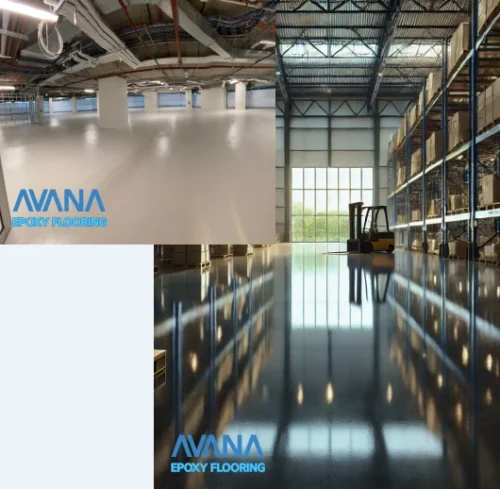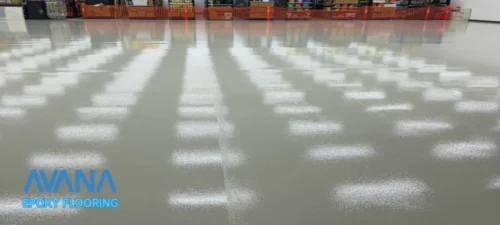Why Warehouse Epoxy Flooring?
AVANA Warehouse Epoxy Flooring has been a popular alternative for warehouse management due to its superior performance, adaptability, and cost-effectiveness. Epoxy flooring is extremely durable, making it ideal for high-traffic industrial environments. Not only does warehouse epoxy flooring improve safety because it is slip-resistant, but it also requires less upkeep.
How Can AVANA Warehouse Epoxy Flooring Be Effective?
- Durability and Strength: Warehouse epoxy flooring is extremely durable and can withstand heavy equipment such as forklifts and pallet jacks. Its impact-resistant properties ensure little wear and tear, especially in high-traffic areas.
- Enhances Safety: Epoxy flooring improves adherence and minimizes accident risk by using anti-slip chemicals. Additionally, its smooth finish improves lighting, leading to a brighter and safer workplace.
- Ease of Maintenance: Epoxy flooring is easy to clean and maintain because of its seamless surface. You can quickly wipe away dust, dirt, and spills, ensuring a tidy workspace with minimal effort.
- Chemical Resistance: Many warehouses deal with chemicals, oils, and other substances that can damage normal flooring. Epoxy flooring is resistant to chemical spills, making it a safe and reliable option.
- Cost-Effective: Warehouse flooring may seem like an investment due to the initial installation costs, but its long-term benefits, including reduced maintenance costs and extended lifespan, make it a cost-effective choice.
Applications of Warehouse Epoxy Flooring
By investing in epoxy flooring, you’re ensuring a reliable foundation for your operations, improving both functionality and safety in your workspace. Epoxy is an ideal option, no matter how big or small your warehouse is or places like Storage Facilities, Workshops, Manufacturing Plants, Distribution Centers, Food Proccecing Places, as it can withstand heavy traffic and hursh conditions. You can also customize it; epoxy flooring offers a range of customization options, including color and line markings, which are great for defining work zones, pathways, and storage areas in a warehouse.
Installation Process
Installing warehouse epoxy flooring involves several steps to ensure a long-lasting and effective finish, so choosing the professional contractors is essential to achieving the best results. Those who have experience in warehouse environments, using quality materials and excellent customer reviews.
- Surface Preparation: Clean the concrete surface thoroughly and repair to fill cracks, remove grease, and dirt.
- Primer Application: Use a primer to ensure that the epoxy coating adheres to the concrete.
- Epoxy Coating: Mix and apply the epoxy resin and hardener in layers to achieve maximum thickness and durability.
- Curing Time: The flooring requires curing time to harden completely, ensuring maximum performance.




